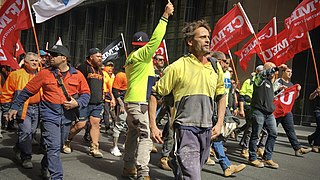A trade union or labor union, often simply referred to as a union, is an organization of workers whose purpose is to maintain or improve the conditions of their employment, such as attaining better wages and benefits, improving working conditions, improving safety standards, establishing complaint procedures, developing rules governing status of employees and protecting and increasing the bargaining power of workers.

Strike action, also called labor strike, labour strike in British English, or simply strike, is a work stoppage caused by the mass refusal of employees to work. A strike usually takes place in response to employee grievances. Strikes became common during the Industrial Revolution, when mass labor became important in factories and mines. As striking became a more common practice, governments were often pushed to act. When government intervention occurred, it was rarely neutral or amicable. Early strikes were often deemed unlawful conspiracies or anti-competitive cartel action and many were subject to massive legal repression by state police, federal military power, and federal courts. Many Western nations legalized striking under certain conditions in the late 19th and early 20th centuries.

The Fire Brigades Union (FBU) is a trade union in the United Kingdom for wholetime firefighters, retained firefighters and emergency control room staff.

The Professional Air Traffic Controllers Organization (PATCO) was a United States trade union of air traffic controllers that operated from 1968 until its decertification in 1981 following an illegal strike broken by the Reagan administration; in striking, the union violated 5 U.S.C. (Supp. III 1956) 118p (now 5 U.S.C. § 7311), which prohibits strikes by federal government employees.
Overtime bans are a type of strike in which workers refuse to engage in overtime work, being any work that falls outside of contracted hours. They do this to leverage their employer into negotiating various working conditions. Often organised in unions, workers may choose this form of industrial action to bargain for a higher rate of pay, better working conditions or to discourage an employer from making redundancies. Unlike a full strike in which employees are usually in breach of their contract, workers engaging in overtime bans are typically well protected. Employers cannot legally withhold normal wages during an overtime ban if employees are not breaching the terms of their employment contracts by refusing to do overtime work. However, the legalities of overtime bans do vary between countries. Overtime bans are effective where "industries and organisations run on such habitually high levels of overtime or goodwill that overtime bans ... can have a significant and immediate impact upon the availability of a good or service". Historically, unions have at times received criticism on ethical grounds for choosing to enact overtime bans. The literature records the occurrence of such bans from the 1800s and there is documentation of their use in four continents.

The National Air Traffic Controllers Association (NATCA) is a labor union in the United States. It is affiliated with the AFL–CIO, and is the exclusive bargaining representative for air traffic controllers employed by the Federal Aviation Administration (FAA). It also represents a range of workers related to the air traffic control (ATC) industry, and the FAA itself.
The SouthAfrican Mine Workers' Strike was a labour dispute involving mine workers of Witwatersrand in South Africa. It started on 12 August 1946 and lasted approximately a week. The strike was attacked by police and over the week, at least 1,248 workers were wounded and at least nine killed.

International Transport Workers Federation v Viking Line ABP (2007) C-438/05 is an EU law case of the European Court of Justice, in which it was held that there is a positive right to strike, but the exercise of that right could infringe a business's freedom of establishment under the Treaty on the Functioning of the European Union article 49. Often called The Rosella case or the Viking case, it is relevant to all labour law within the European Union. The decision has been criticised for the Court's inarticulate line of reasoning, and its disregard of fundamental human rights.
The National Trades Union Congress (NTUC) spearheads the labour movement of Singapore, which represents almost a million workers in the country across more than 70 unions, affiliated associations and related organisations. Singapore runs on a tripartism model which aims to offers competitive advantages for the country by promoting economic competitiveness, harmonious government-labour-management relations and the overall progress of the nation.
The labour movement is the collective organisation of working people to further their shared political and economic interests. It consists of the trade union or labour union movement, as well as political parties of labour. It can be considered an instance of class conflict.
The 1998 Danish general strike was a general strike in Denmark in the spring of 1998 involving around 500 000 workers, around 10% of the Danish population.
A number of labour strikes, labour disputes, and other industrial actions have occurred in 2024.
In 2005, a number of labour strikes, labour disputes, and other industrial actions occurred.
In 2000, a number of labour strikes, labour disputes, and other industrial actions occurred.
In 1998, a number of labour strikes, labour disputes, and other industrial actions occurred.
In 1999, a number of labour strikes, labour disputes, and other industrial actions occurred.
In 1997, a number of labour strikes, labour disputes, and other industrial actions occurred.
A number of labour strikes, labour disputes, and other industrial actions occurred in 1992.




